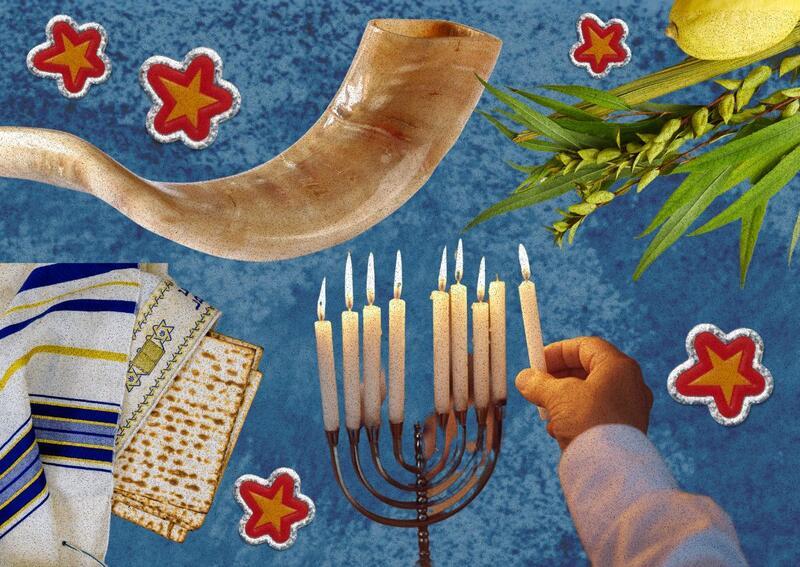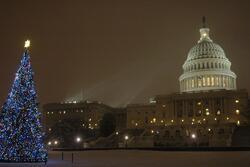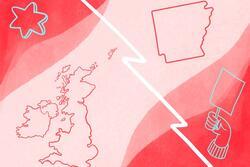‘Tis the Season to Rethink Christmas Spirit
It’s fine if Mariah Carey doesn't want a lot for Christmas, but the rest of us are expected to have higher hopes. We’re supposed to want everything: yule logs and candy canes, nutcrackers and eggnog. We should want carolers outside our window and Santa Claus in our chimney. We should want our token hanukkiahs in a corner, and our rolodex of politically correct season's greetings (MerryChristmasHappyHanukkahJoyousKwanzaaFelizNavidadHappyNewYear!) at the ready.
Growing up, December left me feeling grinchy, resenting the pervasiveness of American Christmas culture. Even in the very Jewy Brooklyn where I was raised, I’d wind up feeling, in the words of Adam Sandler’s Hanukkah Song, “like the only kid in town without a Christmas tree.” Over time, I came to appreciate the holiday, for all its pluses and minuses. Helping a family friend decorate her tree, learning the stories behind each ornament, I saw how meaningful Christmas could be. I loved the arbitrariness of “holiday cheer,” an insistence on random happiness. I loved the cheesy music and cutesy movies. I loved the ironies of Jewish-American Christmas rituals—going out for Chinese food and a movie, listing all the Christmas songs written by Jews.
Still, something about this time of year has always left a bitter taste in my mouth. It’s no secret that Hanukkah only matters when it’s parallel to Christmas, and Kwanzaa’s only considered relevant by mainstream society when it sells Hallmark cards. “The holiday season” may sound more progressive than “the Christmas season,” but it ignores the fact that the most important Jewish holiday season (which includes Rosh Hashanah, Yom Kippur, Sukkot, Shemini Atzeret, and Simchat Torah) is usually over by late October. And the dominant version of Christmas isn’t even universal to all Christians—National Take Down The Christmas Tree Day, for example, falls on January sixth, essentially flipping off Eastern Orthodox Christians who celebrate Christ’s birth that same day.
“[In] the politically correct world that everybody lives in … we all pretend that all the holidays are equal,” Jewish comedian Alex Edelman quipped in his one-man Broadway show Just For Us. “They’re not equal. Hanukkah is very much the Diet Coke to Christmas’s black tar heroin. There is no comparison.”
Six-year-old me, who’d complain that “nobody’s talking about Hanukkah,” would be glad to know that Hanukkah recognition has long been on the rise. In the weeks leading up to Christmas, I’ll get asked what I’m hoping for as a Hanukkah gift, even if the holiday has already passed. Symbols of Hanukkah (sufganiyot, menorahs) become symbols of Judaism, and symbols of Judaism (magen david, or stars of David) become symbols of Hanukkah. While well-intentioned, the emphasis on Hanukkah often feels off. Hanukkah isn’t the most holy, most meaningful, most interesting, or most fun Jewish holiday—yet, because of its proximity to Christmas, it’s by far the most well-known.
Judaism, for me, has never been an ugly sweater I could shrug off at the end of December or a set of sparkling ornaments I boxed back up after night eight. The Judaism I subscribe to doesn’t always have to be somber, but it is never materialistic or shallow.
Christmas-ifying Hanukkah and Hanukkah-ifying Christmas won’t lead to true cultural sensitivity. Even if every single corporation in the United States sent me a “Chag Sameach” card on the twenty fifth of Kislev, I’d want more. I’d want just a few more sporting events, debate tournaments, theater performances, standardized tests, and formal dances that didn’t take place on Shabbat. I’d want to know more about holidays with absolutely nothing to do with Christmas (or Judaism, for that matter): Vaisakhi, Pentecost, Pongal. I’d want to walk past department stores that didn’t celebrate diversity only when it was convenient, that acknowledged holidays even when they didn’t directly profit from them. I’d want a society that knew holiday spirit can mean sugar cookies, Mariah Carey, latkes, elves on shelves—but also apples and honey, dancing with the Torah, hamantaschen, even fasting.
For the holiday season to fully embrace inclusivity, it must acknowledge that it can’t include everything. Once we start prioritizing holidays that happen all year, and not just from Thanksgiving to January first, we’ll be able to fully enjoy the kaleidoscope of celebrations all around us.
This piece was written as part of JWA’s Rising Voices Fellowship.






